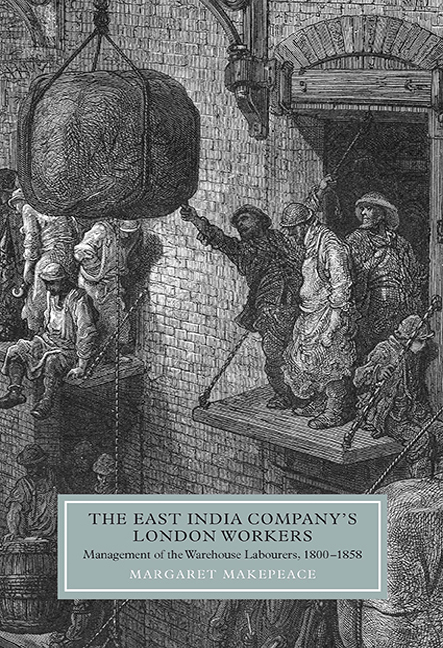Book contents
- Frontmatter
- Contents
- Figures and tables
- Dedication
- Acknowledgements
- Abbreviations
- 1 Introduction
- 2 The East India Company Warehouses
- 3 The Warehouse Labourers
- 4 Management Strategies: Incentives, Rewards and Benevolence
- 5 Management Strategies: Systems of Internal Control
- 6 The Royal East India Volunteers: The ‘Union of Civil and Military Dependence’
- 7 The Relationship Between the East India Company and its London Warehouse Labourers
- 8 The Warehouse Closures
- 9 Management of the Warehouse Labourers and Pensioners 1838–1858
- Conclusion: ‘Good Masters to the Lower Class of Their Dependents’
- Bibliography
- Index
Conclusion: ‘Good Masters to the Lower Class of Their Dependents’
Published online by Cambridge University Press: 13 April 2017
- Frontmatter
- Contents
- Figures and tables
- Dedication
- Acknowledgements
- Abbreviations
- 1 Introduction
- 2 The East India Company Warehouses
- 3 The Warehouse Labourers
- 4 Management Strategies: Incentives, Rewards and Benevolence
- 5 Management Strategies: Systems of Internal Control
- 6 The Royal East India Volunteers: The ‘Union of Civil and Military Dependence’
- 7 The Relationship Between the East India Company and its London Warehouse Labourers
- 8 The Warehouse Closures
- 9 Management of the Warehouse Labourers and Pensioners 1838–1858
- Conclusion: ‘Good Masters to the Lower Class of Their Dependents’
- Bibliography
- Index
Summary
the east India Company's treatment of its London labourers was subjected to public scrutiny by contemporaries. After Dr James Mitchell had gathered evidence about the Company's health policy in the warehouses for submission to the Factories Inquiry Commission in 1833, he commented that the Company's policy of providing free medical attention to the men was both ‘wise’ and ‘humane’. Yet in April of that year, The Times received a letter of complaint allegedly signed by ‘One of the “Labourers”’, levelling ‘divers charges against the Company, of niggardliness, want of feeling, harshness, injustice, and so forth, manifested towards the men employed in their several warehouses’. Never a particular friend to the Company, The Times examined carefully the ‘allegations of moral, though not legal, wrongs in a public body towards individuals whom fortune has placed within its power’. It concluded however that ‘there never came before us, within our memory, a tissue of complaints more utterly groundless and absurd, or of expressions more acrimonious and offensive’. The newspaper rejected the correspondent's ‘violent invectives against the Court of Directors’ as it believed the labourers were paid a fair wage, and any restriction imposed on the men's activities outside the warehouses was:
such as tends immediately to the protection of their goods from plunder, or to the preservation of such a state of health or strength among their labourers as is requisite for the adequate fulfilment of the physical duties, the discharge of which entitles them to their weekly hire. It has generally been said that the East India Company are good masters to the lower class of their dependents, and certainly there is nothing in the ‘Labourer's’ letter to countenance an opposite belief.
The next day The Times published a letter from another unnamed Company labourer who wished to ‘refute and fling back with contempt the gross and false statement’ of the previous correspondent. The letter listed some of the welfare benefits that the warehouse labourers enjoyed, and concluded ‘there are many in the service that were they treated in a superior manner have neither sense to appreciate nor gratitude to acknowledge’.
- Type
- Chapter
- Information
- The East India Company's London WorkersManagement of the Warehouse Labourers, 1800–1858, pp. 195 - 200Publisher: Boydell & BrewerPrint publication year: 2010

